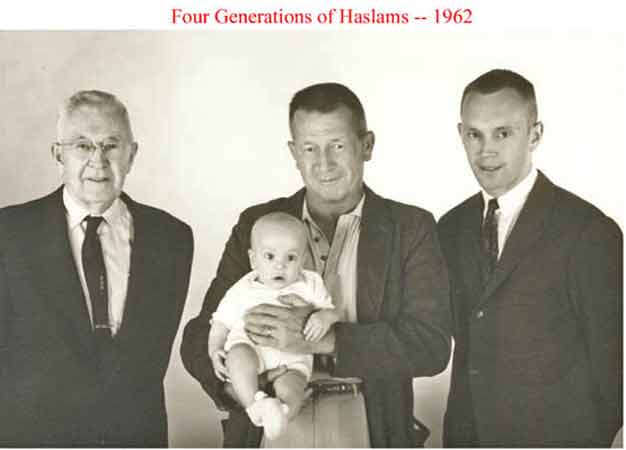Prostate Cancer Can Be Conquered With Help From More Foot Soldiers

All of whom developed prostate cancer. It runs in familes.
For the second time in my life, I find myself a foot soldier, this time on the front lines of a medical war. Six months ago, I volunteered to enter a clinical trial at the University of California- Mount Zion Cancer Center.
Of course, I'd rather not have been in a position to enlist, but last winter, only 18 months after I completed treatments for prostate cancer, the malignancy returned. That immediately and dramatically changed my relationship with the disease. Until then, I could harbor the hope that I might be cured. Not any more.
That's my own fault, of course, since this is an eminently curable malignancy when caught early. In fact, the number of deaths it causes annually is falling (37,000 in 1990; 31,900 in 2000*) while the number of new cases is rising. This is due largely to early detection achieved by testing for prostate specific antigen (PSA), a disease marker in the blood, suggests Dr. Daniel Petrylak of New York-Presbyterian Medical Center.
Unfortunately, my cancer wasn't detected early enough. I missed only one annual physical, 1995 — exactly the wrong time as it turned out; by the next year, I had gone from a man with a high-normal PSA score to a man with a tumor flowering out of his prostate and micro-metastasis loose in his body.
Radical surgery, followed by 7 1/2 weeks of radiation and six months of hormonal ablation — the formal term for chemical castration — beat the cancer back for awhile, then my PSA began rising again. By last spring, I learned that not only had it returned, but that it was roaring back, quadrupling in size in just five months.
Therapeutic options for recurrent prostate cancer are limited, though temporarily effective. I would have to go back on hormonal ablation, likely for the rest of my life. This malignancy is fueled by testosterone, so eliminating the male androgen stops its growth until the cancer becomes hormone independent.
Unfortunately, that treatment would also kill my libido, lead to a loss of muscle and bone mass, induce hot flashes and lessen my energy level. “It's better than being dead,” a colleague in the Sonoma County Prostate Cancer Support Group told me, “but sometimes you're not sure how much better.”
Determined to help me avoid chemical castration as long as possible, my oncologist referred me to the University of California San Francisco-Mount Zion Cancer Center, one of the world's most advanced arenas of prostate-cancer research. Because my fitness level was high, I was a strong candidate for a clinical trial.
After consulting with the chief of urological oncology, Dr. Eric Small, I volunteered to be part of a Stage II inquiry employing GMCSF (granulocyte macrophage colony stimulating factor), an immune-system booster that I inject daily — 14 days on, 14 days off. So far, it has dramatically slowed the rise of my PSA.
Dr. Small is confident that researchers are closing in on therapies that will finally allow control, if not cure, of advanced prostate cancer, but more foot soldiers are needed. UCSF has only about half the number of volunteers it requires for current clinical trials. Not volunteering may be a guy thing in the worst sense. Medical writer Kevin Singer points out that one reason studies on breast cancer are ahead of studies on prostate cancer is that “women tend to enter breast cancer clinical trials in droves, compared to the often paltry enrollment numbers seen in prostate cancer trials.“
There are other problems that may also follow from male reticence: Membership in prostate-cancer support groups tends to be low relative to the number of cases diagnosed. Men have also been reluctant to become politically active in their own behalf. So, for example, although prostate cancer afflicts nearly as many Americans annually as does breast cancer (projections for 2000 are 180,400 prostate, 184,200 breast), funding for studies of the former lags disproportionately.
Why the reluctance? “A lot of men are in denial,” asserts urologist Alfonso Richards. “It's easier to act like nothing's wrong.”
Of course, prostate cancer does tend to be relatively indolent, an older guys' disease that now kills significantly fewer Americans annually than does a scourge like breast cancer (which will claim 40,800 women and 400 men this year), but until better treatments are developed, many survivors of prostate cancer are apt to feel maimed: impotent, incontinent, castrated. And many other men will die.
For those in the grip of advanced prostate cancer, fighting for their lives often precludes political activism or much else. Entering a clinical trial can support a man in his personal battle while he helps medicine win the larger war.
I can candidly reveal that participating in a study has not only enhanced my health, but it has also given me the satisfaction of knowing that this unpleasant experience can serve a purpose beyond my struggle for survival. Besides, it also gives me the delicious sensation that I'm landing a few counterpunches on the beast that's trying to kill me.
Look for information on clinical trials in urological oncology at UCSF-Mount Zion Cancer Center. Prostate Cancer Can Be Conquered With Help From More Foot Soldiers originally appeared in the San Francisco Chronicle for November 3, 2000. |

